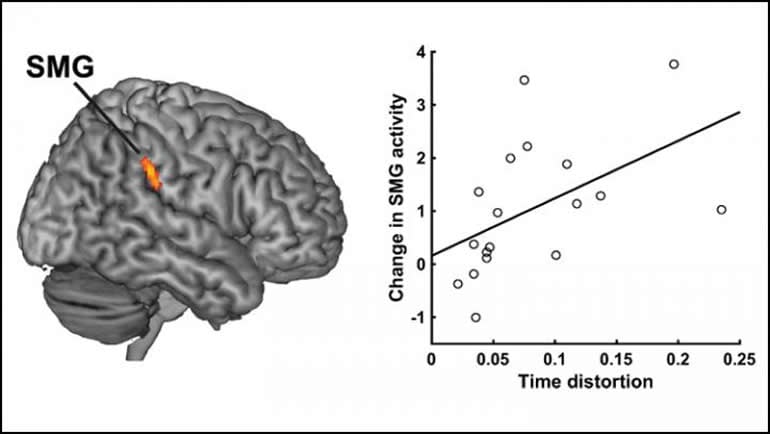Summary: Time-sensitive neuron fatigue in the supramarginal gyrus skew how we perceive time.
Source: SfN
On some days, time flies by, while on others it seems to drag on. A new study from Journal of Neuroscience reveals why: time-sensitive neurons get worn out and skew our perceptions of time.
Neurons in the supramarginal gyrus (SMG) fire in response to a specific length of time. If repeatedly exposed to a stimulus of a fixed duration, the neurons fatigue. Since other neurons continue firing normally, our subjective perception of time becomes skewed.
Hayashi and Ivry measured brain activity with fMRI as human participants engaged in a time comparison task. Healthy adult participants viewed a visual adaptor (a grey circle) for a set length of time, 30 times in a row.

After this adaptation period, they were shown a test stimulus and indicated its duration. If the adaptor duration was long, the participants underestimated time; if the adaptor duration was short, they overestimated time. Activity in the SMG decreased when the adaptor and test stimulus were similar in length, indicating neuron fatigue.
The extent of skewed time perception correlated with how much the activity in the SMG decreased — greater fatigue led to greater time distortion.
About this neuroscience research article
Source:
SfN
Contacts:
Calli McMurray – SfN
Image Source:
The image is credited to Hayashi and Ivry, JNeurosci 2020..
Original Research: Closed access
“Duration-selectivity in right parietal cortex reflects the subjective experience of time” by Masamichi J. Hayashi and Richard B. Ivry. Journal of Neuroscience.
Abstract
Duration-selectivity in right parietal cortex reflects the subjective experience of time
The perception of duration in the subsecond range has been hypothesized to be mediated by the population response of duration-sensitive units, each tuned to a preferred duration. One line of support for this hypothesis comes from neuroimaging studies showing that cortical regions, such as in parietal cortex exhibit duration tuning. It remains unclear if this representation is based on the physical duration of the sensory input or the subjective duration, a question that is important given that our perception of the passage of time is often not veridical, but rather, biased by various contextual factors. Here we used fMRI to examine the neural correlates of subjective time perception in human participants. To manipulate perceived duration while holding physical duration constant, we employed an adaptation method, in which, prior to judging the duration of a test stimulus, the participants were exposed to a train of adapting stimuli of a fixed duration. Behaviorally, this procedure produced a pronounced negative aftereffect: A short adaptor biased participants to judge stimuli as longer and a long adaptor biased participants to judge stimuli as shorter. Duration tuning modulation, manifest as an attenuated BOLD response to stimuli similar in duration to the adaptor, was only observed in the right supramarginal gyrus (SMG) of the parietal lobe and middle occipital gyrus, bilaterally. Across individuals, the magnitude of the behavioral aftereffect was positively correlated with the magnitude of duration tuning modulation in SMG. These results indicate that duration-tuned neural populations in right SMG reflect the subjective experience of time.
SIGNIFICANCE STATEMENT
The subjective sense of time is a fundamental dimension of sensory experience. To investigate the neural basis of subjective time, we conducted an fMRI study, using an adaptation procedure that allowed us to manipulate perceived duration while holding physical duration constant. Regions within the occipital cortex and right parietal lobe showed duration tuning that was modulated when the test stimuli were similar in duration to the adaptor. Moreover, the magnitude of the distortion in perceived duration was correlated with the degree of duration tuning modulation in the parietal region. These results provide strong physiological evidence that the population coding of time in the right parietal cortex reflects our subjective experience of time.






